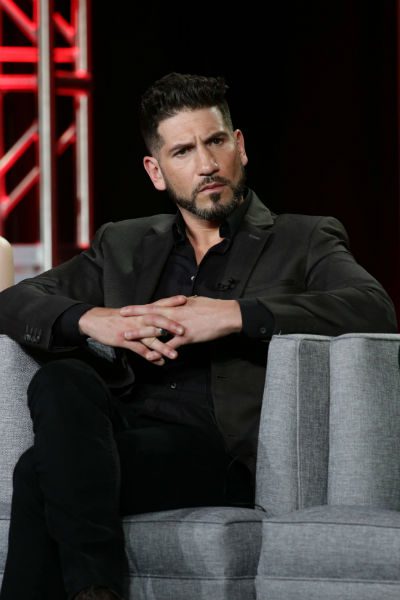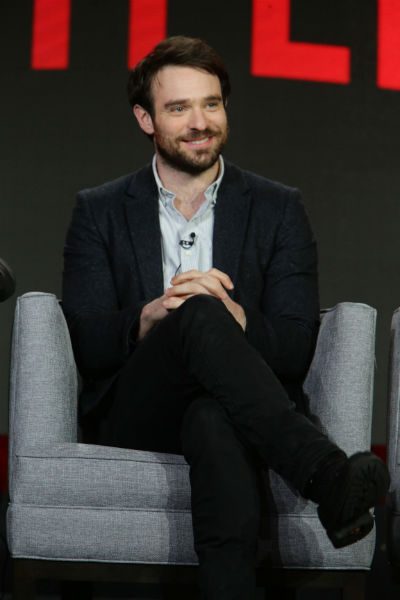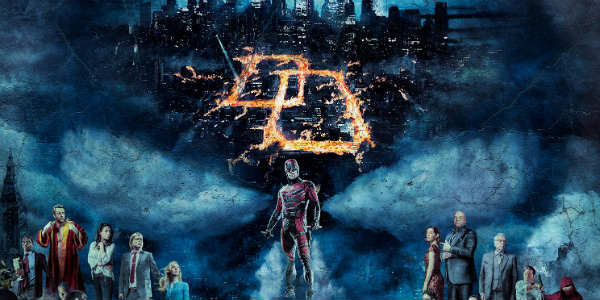When “Marvel’s Daredevil” returns for a second season on Netflix on March 18, blind-lawyer-turned-costumed-vigilante Matt Murdock (Charlie Cox), a k a Daredevil, a k a The Devil of Hell’s Kitchen (New York), has momentarily reconciled the idea of being a non-lethal avenger with his deeply held Catholic faith.
But then Frank Castle (Jon Bernthal), a k a The Punisher, comes to town, and and the whole vigilante business takes a dark turn.
 Speaking during a press conference at the recent TV Critics Association Press Tour in Pasadena, Bernthal said of his brutal, ex-Green Beret character:
Speaking during a press conference at the recent TV Critics Association Press Tour in Pasadena, Bernthal said of his brutal, ex-Green Beret character:
Since so much of Season 1 was about Matt sort of dealing with this decision to be a hero, here comes this guy who’s really not concerned with that, about being a hero. If I got one thing from the comics … his superpower is his rage. His superpower is that he is not going to quit, and he is going to go forward no matter what. And that’s as human and grounded a quality as this sort of genre have. That is the perfect show to reintroduce a character like that.
Also on hand is Elektra (Elodie Yung), a former love of Murdock’s, who also doesn’t seem to have any qualms about doing whatever helps her achieve her goals. Said Yung:
Elektra is kind of a sociopath. This world is a game for her. It’s like a chess game, and what motivates her is what she wants. She’ll use anything she needs to use to get to her goal, and if she needs to kill people, she would. She has this coldness and this sociopath in her, and I tried to keep that. But, on the other hand, we wanted to create a character with different layers. Elektra isn’t a bad person; she’s not a good person. She’s a person with different traits, with layers, and she’s seeking for who she is. So, this season, there’s an arc to her story, and hopefully, we’ll find out who she is really by the end of it.
All of this takes Murdock’s momentarily settled conscience and gives it a hard shake. Said Cox:
If we think of the first season as kind of Matt Murdock’s evolution into Daredevil, the scenes that strike me as the ones where we were really able to show his emotional stance shifting and very slow steps towards the reconciliation with himself surrounding who he is, it’s the scenes with Father Lantom, with the priest. Obviously, it was a great deal of his Catholicism, which he was battling with in the first season.
As he began to make peace with that, he was able, therefore, to allow himself to explore this other side of him, and probably the best example of that is there is a scene in episode ‑‑ I think it’s episode 11, or maybe 12 ‑‑ where Father Lantom uses the term “a symbol to be feared.” In hearing that, suddenly, that moment, he knows. It gives him license to be what he’s been dying to be, to engage in vigilante justice wholeheartedly without the fear of eternal damnation.
Actually, it was episode 11, called “The Path of the Righteous,” and here’s the exchange:
Lantom: I have a pretty good idea who you are and what you do. How you do it… That’s something else entirely.
Murdock: Accident when I was a kid. Used to think it was God’s will.
Lantom: Used to?
Murdock: Yeah, He made each and every one of us with a purpose, didn’t He? A reason for being.
Lantom: I believe so, yes.
Murdock: Then why did he put the Devil in me? Why do I feel it in my heart and my soul clawing to be let out if that’s not all part of God’s plan?
Lantom: Maybe you’re being called to summon the better angels of your nature. Maybe that’s the struggle you’re feeling deep within you.
Murdock: And how do you know the angels and the Devil inside me aren’t the same thing?
Lantom: I don’t, but nothing drives people to the church faster than the thought of the Devil snapping at their heels. Maybe that was God’s plan all along. Why He created him, allowed him to fall from grace to become a symbol to be feared warning to us all, to tread the path of the righteous.
But then season two begins, and the Punisher starts wreaking havoc. I asked Cox what his journey is this year, and he said:
With [last year’s villain] Wilson Fisk in jail, the crime rate has plummeted. Daredevil is looking after his town, his Hell’s Kitchen, pretty well, and things have returned to normal, if not better than normal.
What then happens is with the emergence of two people in particular, initially one person, in Frank Castle. Having, as you say, put to bed a lot of the kind of arguments in his mind about who he is, what he is, what he’s capable of, how much of a right he has to do what he’s doing, having reconciled most of those inner demons, if you’d like, he then presented with someone who forces Matt to re-question everything that he is.
If people are going to draw parallels between him and Frank Castle, if the world is going to do that, then ‑‑ and, certainly, Matt cannot ‑‑ there’s no way that he can agree with the methods with which Frank Castle employs his vigilante justice. Then it means that Matt has to kind of, reevaluate who he is and what he does and whether what he’s doing is helpful or detrimental to the society in which he lives.
Then I wondered how the faith element helped set him apart from other superheroes, made him more human. Cox said:
The Catholicism helps. It helps that story. If you want to play a complex, turmoiled character, then give him a dose of Catholicism.
Cox is also Catholic — before “Daredevil,” he played Spanish saint and Opus Dei founder Josemaria Escriva for a 2011 movie called “There Be Dragons,” and spent a lot of time with a priest in preparation for that.
I then asked if doing the show has made him think more about his faith, and Cox replied:
Yeah, it has, actually. Yeah. Yeah.
In conversation after the press conference, Cox told me he considers himself a “revert” to the Faith, but more on that closer to premiere.
Trust me, if you liked Season 1, you won’t be disappointed.
Here’s an artsy little trailer from Netflix just to whet your appetite:
Images: Courtesy Netflix
Don’t miss a thing: head over to my other home at CatholicVote and like my Facebook page; also like the Patheos Catholic FB page to see what my colleagues have to say.














